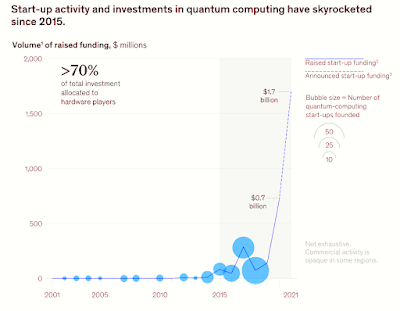Quantum Computing Hardware.
The ecosystem's hardware is a major barrier. The problem is both technical and structural in nature.
- The first issue is growing the number of qubits in a quantum computer while maintaining a high degree of qubit quality.
- Hardware has a high barrier to entry because it requires a rare mix of cash, experimental and theoretical quantum physics competence, and deep knowledge—particularly domain knowledge of the necessary implementation possibilities.
Several quantum-computing hardware platforms are presently in the works.
The realization of completely error-corrected, fault-tolerant quantum computing will be the most significant milestone, since a quantum computer cannot give precise, mathematically accurate outputs without it.
- Experts argue over whether quantum computers can provide substantial commercial value until they are entirely fault resilient.
- Many argue, however, that a lack of fault tolerance does not render quantum-computing systems unworkable.
When will we be able to tolerate flaws as in produce viable fault-tolerant quantum computing systems?
Most hardware companies are cautious to publish their development intentions, although a handful have done so openly.
By 2030, five manufacturers have said that they will have fault-tolerant quantum computing hardware.
If this timeframe holds true, the industry will most likely have established a distinct quantum advantage for many applications by then.
Quantum Computing Software.
The number of software-focused startups is growing at a higher rate than any other part of the quantum-computing value chain.
- Sector players in the software industry today provide bespoke services and want to provide turnkey services as the industry matures.
- Organizations will be able to update their software tools and ultimately adopt completely quantum tools as quantum-computing software develops.
- Quantum computing, in the meanwhile, necessitates a new programming paradigm—as well as a new software stack.
- The bigger industry players often distribute their software-development kits for free in order to foster developer communities around their goods.
Quantum Computing Cloud-Based Services.
In the end, cloud-based quantum-computing services may become the most important aspect of the ecosystem, and those who manage them may reap enormous riches.
- Most cloud computing service providers now give access to quantum computers on their platforms, allowing prospective customers to try out the technology.
- Due to the impossibility of personal or mobile quantum computing this decade, early users may have to rely on the cloud to get a taste of the technology before the wider ecosystem grows.
Ecosystem of Quantum Computing.
According to our analysis, the value at stake for quantum-computing businesses is close to $80 billion (not to be confused with the value that quantum-computing use cases could generate).
Private And Public Funding For Quantum Computing
Private financing, on the other hand, is fast expanding.
Investments in quantum computing start-ups have topped $1.7 billion in 2021 alone, more than double the amount raised in 2020.
- As quantum computer commercialization gathers steam, I anticipate private financing to increase dramatically.
- If leaders prepare now, a blossoming quantum-computing ecosystem and developing commercial use cases promise to produce enormous value for sectors.
Quantum computing's fast advancements serve as potent reminders that the technology is soon approaching commercial viability.
- For example, a Japanese research institute recently revealed a breakthrough in entangling qubits (quantum's fundamental unit of information, equivalent to bits in conventional computers) that might enhance error correction in quantum systems and pave the way for large-scale quantum computers.
- In addition, an Australian business has created software that has been demonstrated to boost the performance of any quantum-computing hardware in trials.
- Investment funds are flowing in, and quantum-computing start-ups are sprouting as advancements speed.
- Quantum computing is still being developed by major technological firms, with Alibaba, Amazon, IBM, Google, and Microsoft having already introduced commercial quantum-computing cloud services.
Of course, all of this effort does not always equate to commercial success.
While quantum computing has the potential to help organizations tackle challenges that are beyond the reach and speed of traditional high-performance computers, application cases are still mostly experimental and conceptual.
- Indeed, academics are still disputing the field's most fundamental concerns (for more on these unresolved questions, see the sidebar "Quantum Computing Debates").
- Nonetheless, the behavior shows that CIOs and other executives who have been keeping an eye on quantum-computing developments may no longer be considered spectators.
- Leaders should begin to plan their quantum-computing strategy, particularly in businesses like pharmaceuticals that might profit from commercial quantum computing early on.
- Change might arrive as early as 2030, according to some firms, who anticipate that practical quantum technologies will be available by then.
I conducted extensive research and interviewed experts from around the world about quantum hardware, software, and applications; the emerging quantum-computing ecosystem; possible business use cases; and the most important drivers of the quantum-computing market to help leaders get started planning.
~ Jai Krishna Ponnappan
Further Reading:
You may also want to read more about Quantum Computing here.





